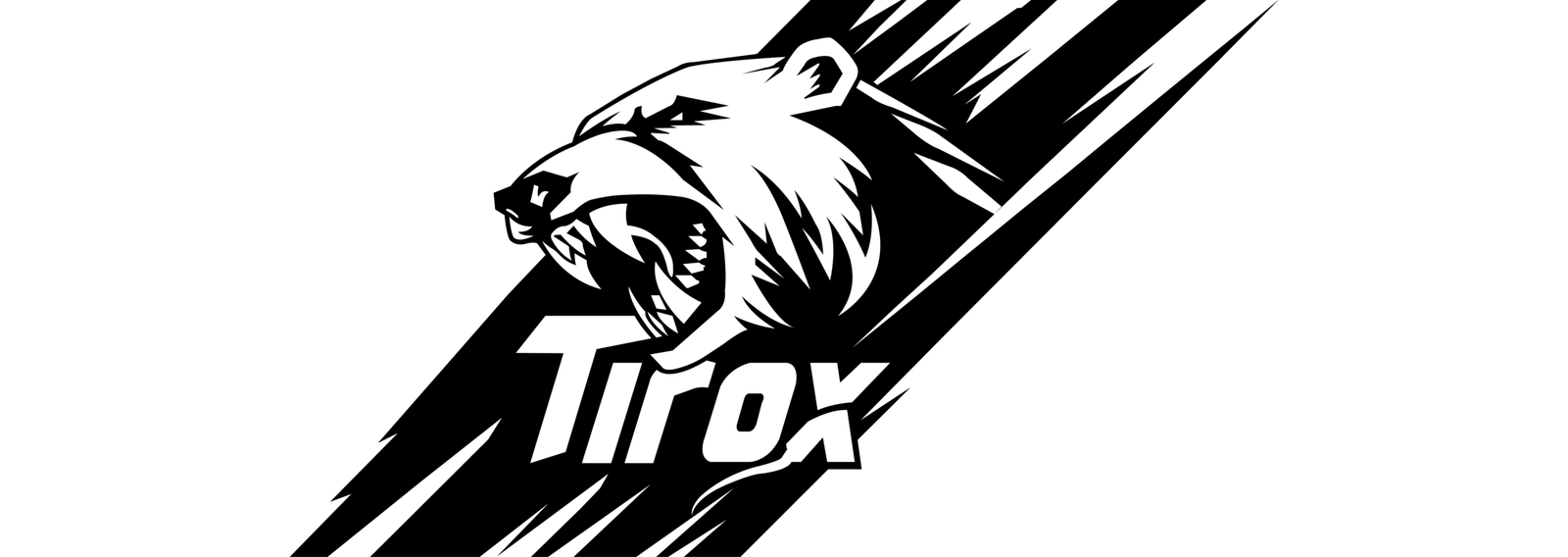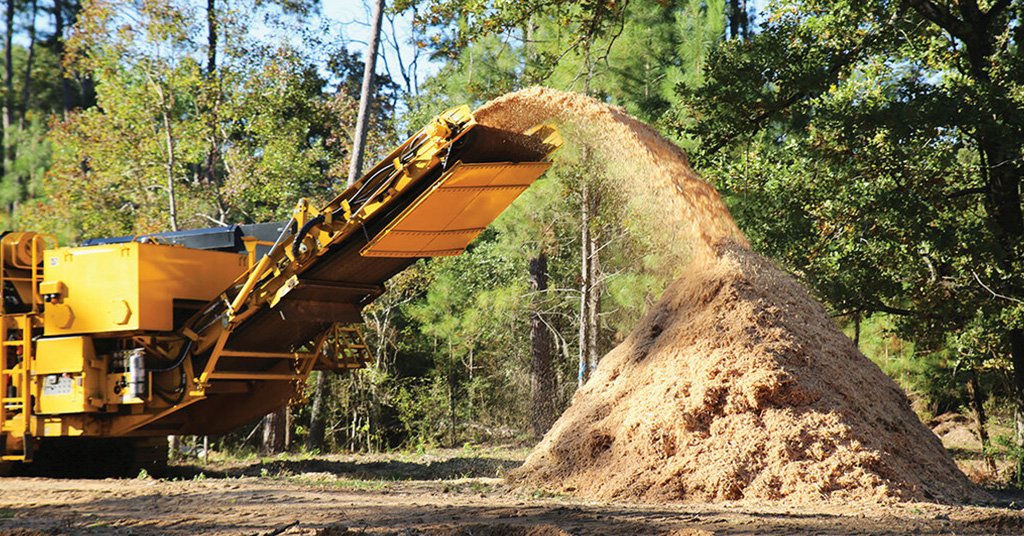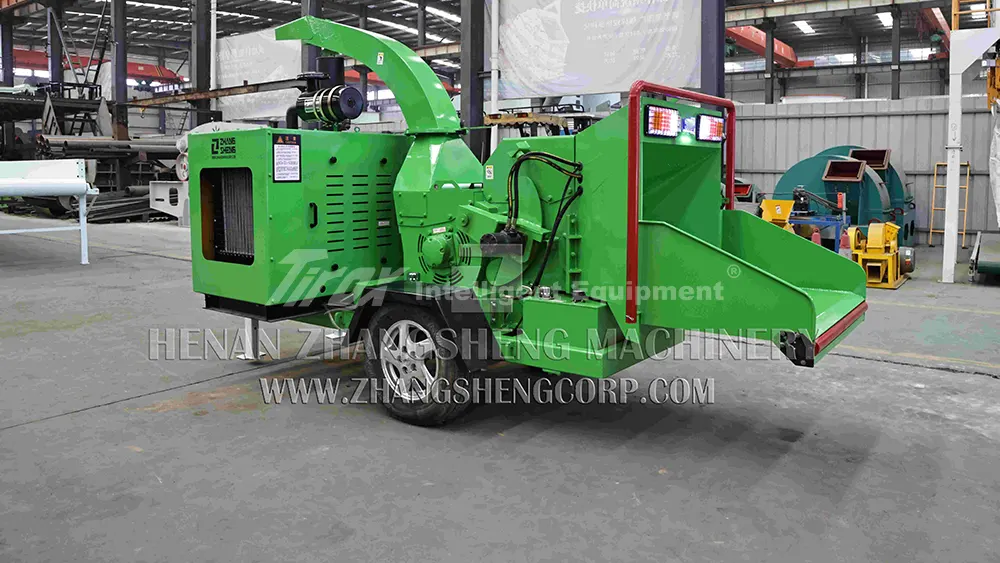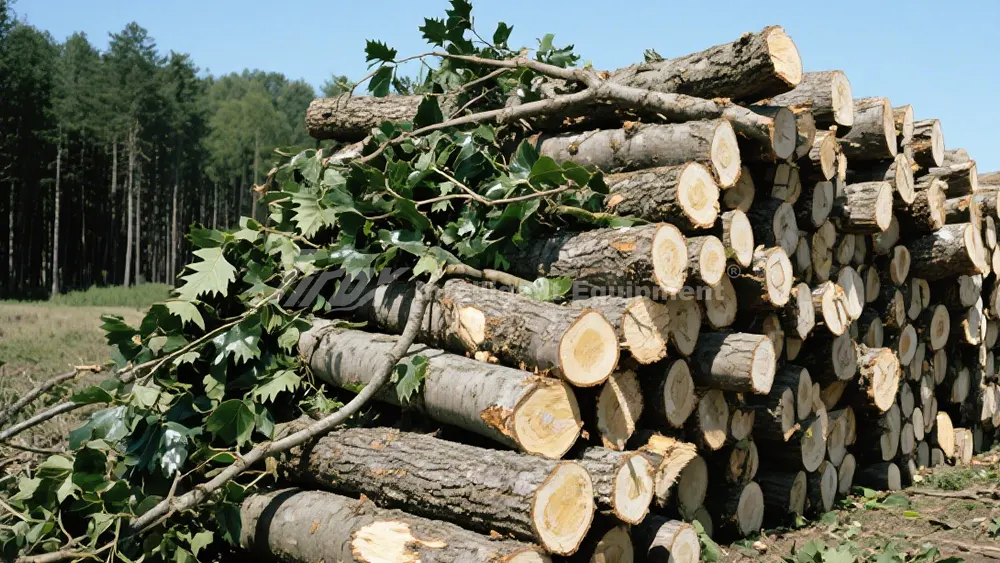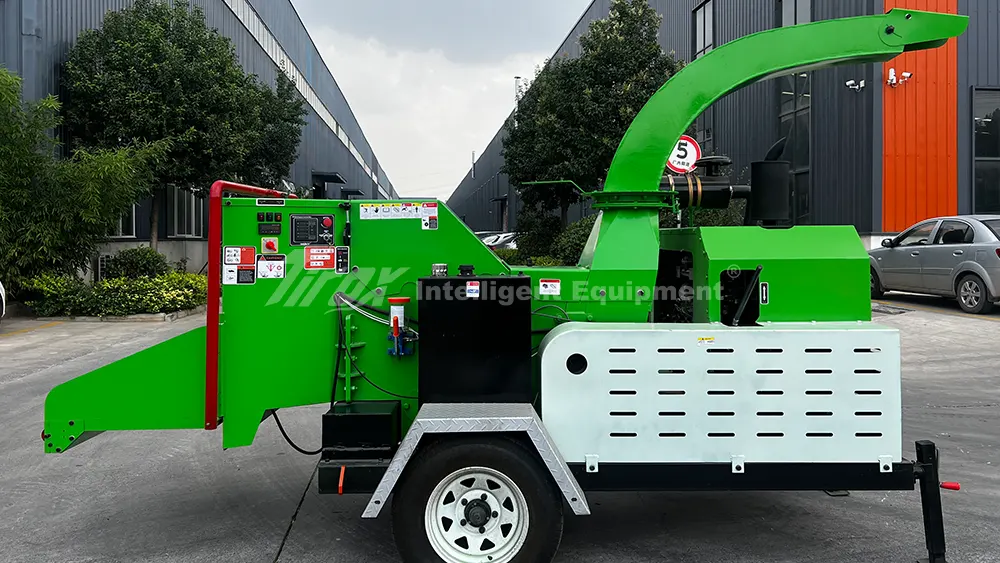You have piles of branches and woody debris cluttering your yard or work site. Getting rid of it is a hassle, and buying mulch can be expensive. You wonder, could that wood chipper turn this problem waste into a valuable garden resource like mulch?
Yes, it is absolutely possible, and common, to use a wood chipper to create mulch. Wood chippers are designed to process branches and woody material into wood chips, and these chips are an excellent form of organic mulch for various landscaping and gardening purposes.
Using a wood chipper is a very practical way to recycle yard waste into something beneficial. As a manufacturer of wood chippers for 22 years, we at TIROX have seen our machines used for this purpose worldwide. Let’s explore how this works and clarify some common questions.
Is a wood chipper the same as a mulcher?
You often hear “wood chipper” and “mulcher” talked about, sometimes even “chipper mulcher.” This can be confusing. Are they just different words for the same machine, or do they actually do different jobs when it comes to processing yard waste?
No, a wood chipper is not the same as a mulcher, although their functions can overlap, and some machines combine features. A wood chipper typically uses sharp knives to cut solid wood branches into small, relatively uniform pieces called wood chips. A mulcher, or more accurately a garden shredder, usually uses hammers or flails to break down softer, often green, material like leaves and small twigs into a finer, less uniform texture.
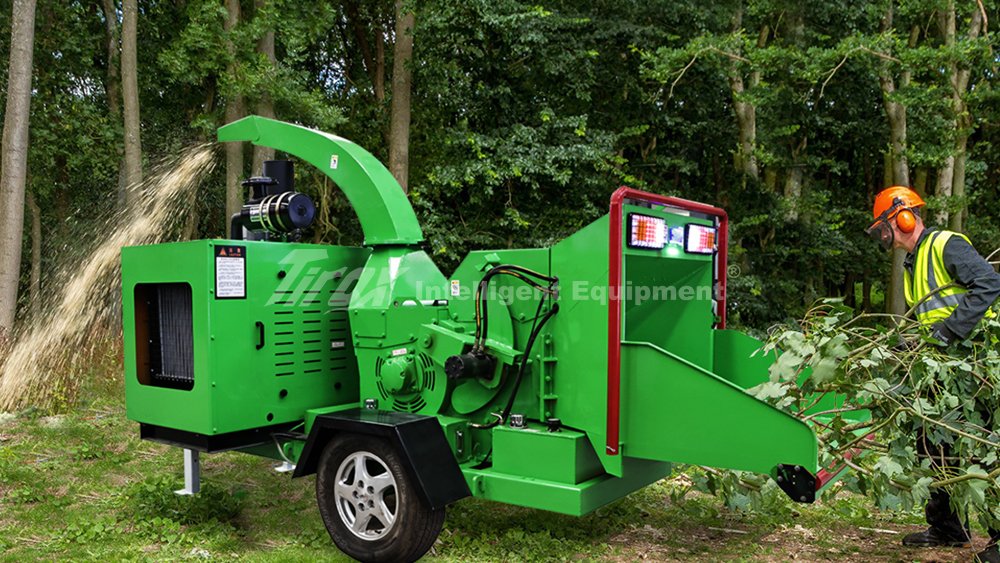
At TIROX, we have specialized in R&D and production of high-quality wood processing machinery for over two decades, exporting our products worldwide [Summary of TIROX]. My experience in this industry shows a clear distinction. A dedicated wood chipper is built to tackle solid wood. It has a powerful engine, like the diesel engines we offer including Huadong, Cummins, or Perkins [5], driving a heavy drum or disc fitted with hardened steel knives. As branches are fed in, often with a hydraulic forced feeding system [5], these knives slice against a bed knife, producing distinct wood chips. The size of these chips can vary, for example, one of our models produces chips with a distribution like 60% being 5mm-20mm [6]. On the other hand, a machine often called a “mulcher” or “shredder,” especially those designed for home garden use, is generally intended for softer materials. Think leaves, grass clippings, plant stalks, and very small twigs. These machines typically use a different mechanism, such as rotating flails or hammers, to beat and shred the material until it’s fine enough to pass through a screen. The output is usually much finer and more compost-like than wood chips. Some machines are marketed as “chipper/shredders.” These try to combine both functions, often having a separate chute for small branches (the chipper part) and a larger hopper for leafy debris (the shredder part). While versatile for some, their wood chipping capacity is often limited compared to a dedicated wood chipper like those we build for more demanding B2B customers such as Forestry & Logging Companies or Waste Management Centers [B2B Target Customers]. Our focus on “Technological Leadership,” like developing the first Tracked Horizontal Grinder in China [Summary of TIROX], means we build machines optimized for their specific tasks.
Key Differences: Chipper vs. Mulcher (Shredder)
| Feature | Wood Chipper (TIROX focus) | Mulcher / Garden Shredder |
|---|---|---|
| Input Material | Solid wood branches, limbs | Leaves, grass, soft green waste, small twigs |
| Cutting Action | Knives on drum/disc slice wood | Flails/hammers beat and tear material |
| Output | Wood chips (e.g., 5mm-50mm range) [6] | Finer, less uniform, shredded material |
| Primary Use | Volume reduction, biomass, chip production | Volume reduction, composting material |
| Durability | Heavy-duty for wood [Summary of TIROX] | Generally lighter duty |
Understanding this difference is important for choosing the right equipment for your needs.
Can a wood chipper make mulch?
You have a wood chipper, or you’re thinking of getting one. The big question for many gardeners and property owners is, can this machine actually produce usable mulch from all those branches? Will the output be suitable for spreading around plants?
Yes, a wood chipper is an excellent machine for making mulch. The wood chips that a chipper produces are a very common and highly effective type of organic mulch. These chips are distinct from the finely shredded material made by a leaf shredder, but they are ideal for many mulching applications.
As a company with over 12 years of continuous international export experience [Summary of TIROX], we’ve seen our wood chippers put to this exact use in 87 countries [Summary of TIROX]. Large farms, landscaping companies, and even municipalities use the wood chips generated by our equipment as mulch [B2B Target Customers]. Wood chips provide many benefits when used as mulch. They help the soil retain moisture by reducing evaporation, which means you might need to water less. They are very effective at suppressing weed growth, as they block sunlight from reaching weed seeds. As they slowly decompose over time, they add valuable organic matter and nutrients to the soil, improving its structure. The size and consistency of the chips are important for good mulch. Our wood chippers are designed to produce a range of chip sizes, for example, one model’s output includes 60% of chips between 5mm and 20mm, and 25% between 20mm and 50mm [6]. This type of size variation creates a good mulch layer that knits together well. This is different from the output of a garden shredder fed with leaves, which creates a much finer material that breaks down more quickly and serves a slightly different purpose, often better for fast composting. Our chippers, with robust features like user-friendly controls for roller functions (forward, reverse, stop) and intelligent feeding systems that prevent blockages [5], ensure consistent production of these valuable chips. The “Made in China + International Quality” we stand for means these machines are built to perform.
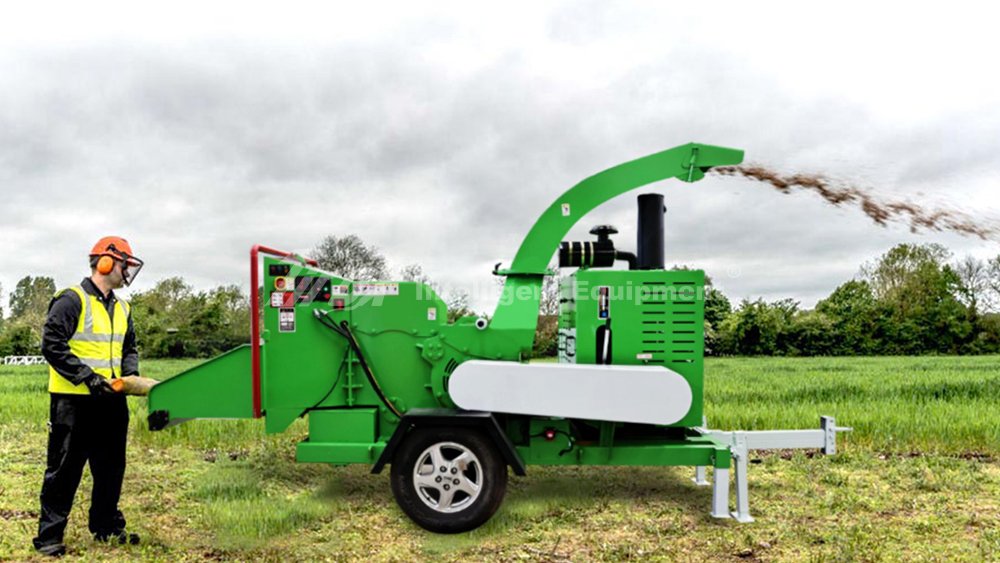
Benefits of Using Wood Chipper Chips as Mulch
| Benefit | How Wood Chips Help |
|---|---|
| Moisture Conservation | Reduces water evaporation from the soil surface. |
| Weed Control | Blocks sunlight, inhibiting weed seed germination and growth. |
| Soil Temperature | Insulates soil, keeping it cooler in summer and warmer in winter. |
| Improved Soil Health | Adds organic matter as it decomposes, improving soil structure and fertility. |
| Reduced Erosion | Helps prevent soil from being washed or blown away. |
| Aesthetic Appeal | Provides a neat, natural look to garden beds and landscaped areas. |
| Waste Reduction | Turns woody yard waste into a valuable resource instead of landfill. |
So, if making mulch is your goal, a wood chipper is a very effective tool for the job.
Can Your Chipper Mulcher’ Wood Chips Be Used As Mulch?
The term “chipper mulcher” still causes some head-scratching. If you own a machine called this, or see one advertised, you want to be sure: are the wood chips it makes actually good for mulching? Will they benefit my garden or landscape projects?
Yes, if your machine, whatever it’s called, has a true chipping function that processes solid wood branches into distinct wood chips, then those chips are definitely suitable for use as mulch. The name of the machine is less important than its actual function and the type of material it produces from wood.
At TIROX, our expertise lies in equipment that effectively processes wood. Our primary products are wood chippers and horizontal grinders [Summary of TIROX]. These machines are designed to take in branches and logs and convert them into wood chips. If a machine labeled as a “chipper mulcher” performs this same wood chipping action – using knives to cut wood into pieces – then its output will be similar to that of a dedicated chipper. These wood chips are ideal for mulching. They offer durability and the slow release of nutrients that benefit the soil. The consistency of the chip size is a factor in how well mulch performs. Our machines, equipped with features like smart control panels that display key operating conditions [5] and powerful diesel engines [1][2][4], are engineered to produce a relatively uniform chip suitable for high-quality mulch. The key is to look at what the machine does to the wood. If it feeds in a branch and outputs small, solid pieces of wood (chips), then you’re good to go for mulching. If the machine is primarily designed for, or currently set up for, shredding soft, leafy material into very fine, almost fluffy matter, that’s different. That material is better suited for rapid composting than for long-lasting mulch. I’ve spoken with many customers during my 15 international exhibitions across 7 countries [Summary of TIROX], and a common theme is the satisfaction of turning waste wood into useful mulch chips with our equipment. It’s about the output – real wood chips.
Checking if Your Machine’s Output is Good for Mulch:
- Does it chip solid wood? The machine must be able to process branches, not just leaves.
- What does the output look like? Are they distinct pieces of wood (chips)? Our specifications detail chip sizes [6].
- Is the chip size appropriate? Chips generally ranging from 1/4 inch to a couple of inches work well.
- How is the wood processed? Look for a knife-based cutting system for true chipping.
If your “chipper mulcher” produces actual wood chips, then yes, those chips are great for mulching.
Conclusion
Yes, a wood chipper is an excellent tool for creating mulch. It turns branches into wood chips, which are ideal for mulching, helping your garden thrive while recycling waste.
